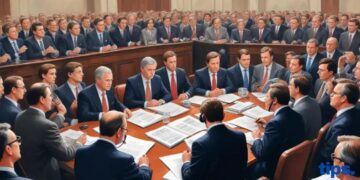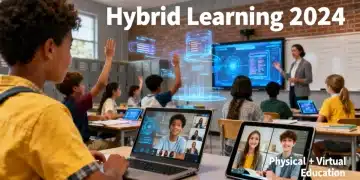2025 presidential election updates: what’s happening now?

Anúncios
The 2025 presidential election involves key issues like healthcare and climate change, where social media and debates play crucial roles in shaping public opinion and voter turnout.
2025 presidential election updates are crucial as we navigate a dynamic political landscape. With new candidates emerging and key issues at play, it’s essential to stay informed. What will the upcoming debates reveal? Let’s dive deeper.
Anúncios
Major candidates to watch in 2025
As we look ahead to the 2025 presidential election, it’s essential to identify the major candidates who are shaping the race. Current fronts include seasoned politicians and new faces, each bringing unique perspectives.
Some candidates to watch closely include:
- Candidate A: Known for their strong stance on economic reform and accessibility to healthcare.
- Candidate B: A fresh voice advocating for climate change action and education reform.
- Candidate C: An established figure with a track record on foreign policy and national security.
These candidates will be critical in influencing voter sentiments and discussions surrounding pressing issues.
Anúncios
Emerging Figures in the Race
It’s also vital to keep an eye on emerging figures, including potential candidates who may announce their candidacy later in the cycle. These individuals could shake up the dynamics significantly.
As the election year approaches, watching how these candidates position themselves on key issues will be essential for voters.
For further details on candidates and their platforms, you can visit Ballotpedia, a reliable source for election information.
Key issues shaping the election
As the 2025 presidential election approaches, several key issues are likely to shape the campaigns and influence voter decisions. Understanding these topics is crucial for both candidates and citizens.
One significant issue is healthcare reform. Many voters are looking for solutions that improve access and affordability. Candidates will need clear plans on how to address this.
Another pivotal topic is climate change. With increasing awareness and urgency surrounding environmental issues, candidates are expected to present actionable plans to combat climate change.
Economic stability also plays a central role. Voters want to hear strategies for job creation, wages, and inflation control.
- Access to quality education is a growing concern for many families.
- The right to vote and election integrity remain hot-button issues that can mobilize the electorate.
- Foreign policy decisions will also be critical, especially in matters of national security.
For deeper insights into these issues, check resources like Pew Research Center, which provide data and analysis on public opinion and trends.
Timeline of significant events
The 2025 presidential election is marked by a series of significant events that shape the political landscape. Understanding this timeline helps voters stay informed about the election process.
Key dates include:
- Primary Elections: Scheduled for early 2025, these elections determine which candidates will represent their parties in the general election.
- National Conventions: These conventions occur mid-2025, where parties officially nominate their candidates and outline their platforms.
- General Election: Set for November 2025, this is when voters will cast their ballots for president.
- Key Debates: Debate schedules will be announced, allowing candidates to present their positions and engage with opponents.
Throughout this timeline, various events such as town hall meetings, forums, and special interest group gatherings will take place. These events allow candidates to connect with voters.
For a full timeline and updates, you can visit the National Association of Secretaries of State website, which provides information on election processes and important dates.
How the media influences public opinion

The media plays a significant role in shaping public opinion during the 2025 presidential election. From news outlets to social media, the way information is presented can influence how voters perceive candidates and issues.
Voters often rely on various media sources to gather information. Here are a few ways the media impacts public opinion:
- Framing: The way news stories are framed can significantly alter perception. Different headlines and angles can lead to different interpretations of the same event.
- Agenda-setting: The media has the power to highlight specific issues, making them more important in the eyes of the public. This can direct attention to policy questions and candidate platforms.
- Fact-checking: Many media organizations provide verification of claims made by candidates, helping voters distinguish between fact and misinformation.
The rise of social media has added another layer. Instant sharing and audience interaction can amplify certain viewpoints quickly. This dynamic can lead to polarized opinions, making it critical for voters to seek diverse perspectives.
For further understanding of media influence, you can explore research from the American Press Institute, which examines how media affects public discourse.
| Category | Summary | Example/Source |
|---|---|---|
| Major Candidates | Watch key figures in the race | Ballotpedia |
| Key Issues | Healthcare, climate, economy | Pew Research Center |
| Election Timeline | Key dates and events in 2025 | NASS.org |
| Media Impact | News and framing shape views | American Press Institute |
| Voter Turnout | Demographics + laws = turnout | U.S. Census Bureau |
| Social Media | Direct reach + viral influence | Pew Research Center |
| Debate Takeaways | Policy clarity and performance | PresidentialDebates.org |
| Historical Context | Trends from past elections | U.S. National Archives |
Voter turnout predictions
Voter turnout is a crucial factor in the 2025 presidential election. Predictions regarding how many people will participate can significantly impact campaign strategies and overall election outcomes.
Several factors influence voter turnout:
- Demographics: Young voters and minority groups often have lower turnout rates. Engaging these groups is essential to increase participation.
- Election laws: Changes in voting laws, such as ID requirements or mail-in voting options, can affect how easily people can vote.
- Motivation and issues: Candidates who connect with the public on pressing issues like healthcare and climate change might drive higher turnout.
Analysts use various methods to estimate turnout. Past election data, surveys, and demographic analysis all play crucial roles in these predictions.
For more insights on voter trends and turnout statistics, check resources like U.S. Census Bureau, which provides detailed data on voter demographics and participation.
Impact of social media on campaigns
Social media has transformed the landscape of political campaigns, especially for the 2025 presidential election. It serves as a powerful tool for candidates to connect with voters and share their messages.
Here are some ways social media impacts election campaigns:
- Direct Engagement: Candidates can directly engage with voters through platforms like Twitter, Facebook, and Instagram, allowing for real-time communication.
- Targeted Advertising: Campaigns can use data analytics to target specific demographics with tailored messages, increasing the effectiveness of their outreach.
- Viral Content: Memes and impactful posts can go viral, reaching a broader audience quickly. This can boost a candidate’s visibility dramatically.
However, the use of social media also has challenges. Misinformation can spread fast, and negative campaigns can impact public perception. Candidates must navigate these pitfalls carefully.
To understand more about the influence of social media in elections, check reputable sources like Pew Research Center, which provides valuable data and insights on the trends and impact of social media in politics.
Debate highlights and takeaways
Debates are key events during the 2025 presidential election cycle, offering candidates a platform to present their views and engage directly with each other. These moments can heavily influence public opinion and voter decisions.
Several highlights from recent debates include:
- Key Issues Addressed: Candidates discussed critical topics like healthcare, climate change, and the economy, providing insights into their policies.
- Fact-Checking Moments: Several statements made during the debates were fact-checked in real-time, showing voters the importance of accurate information.
- Candidate Performance: Analysts and pundits scored candidates on their debate performances, affecting their polling numbers afterward.
Takeaways from these debates illustrate how candidates sharpen their messaging and address public concerns. Understanding the nuances in how issues are approached helps voters make more informed choices.
For official summaries and detailed analysis of the debates, visit sites like The Commission on Presidential Debates, which provides comprehensive information on past and upcoming debates.
Historical context of the election
The historical context of the 2025 presidential election provides valuable insights into the political landscape and voter behavior. Understanding past elections helps us analyze current trends and expectations.
Several key events have shaped American presidential elections:
- Major Legislation: Laws like the Voting Rights Act have significantly impacted voter access and engagement.
- Technological Advances: The rise of the internet and social media has changed how campaigns reach voters and how public opinion is shaped.
- Changing Demographics: Shifts in the U.S. population, including age, ethnicity, and education, influence election outcomes and candidates’ strategies.
Each election brings lessons learned from previous cycles. The role of debates, media influence, and key issues continues to evolve. Analyzing these patterns can help predict what to expect in the upcoming election.
To explore more about the historical context, visit U.S. National Archives, which provides extensive resources on past elections and their significance.
Moving Forward in the 2025 Presidential Election
The 2025 presidential election is not just about one candidate or one issue. It encompasses a wide range of topics that are important to voters, such as healthcare, climate change, and social justice. As the election approaches, it is essential for voters to stay informed about the candidates, their platforms, and the issues that matter most.
Engagement through debates and social media will continue to shape public opinion and influence voter turnout. By understanding the historical context of elections, voters can better grasp the dynamics at play this time around.
Ultimately, your voice matters in this election. Educating yourself and participating in the democratic process will help you make informed decisions. Don’t underestimate the power of your vote—it can lead to meaningful change.





